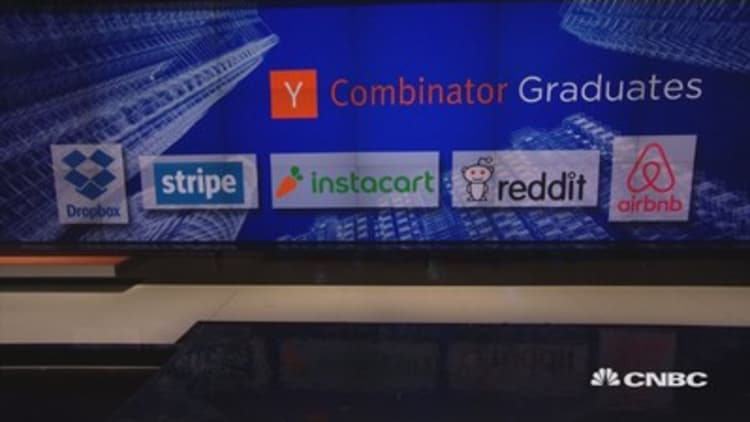
In a standing-room only auditorium at the Computer History Museum in Mountain View, 120 startup founders have two minutes to make the pitch of their lives. In the audience, 500 of Silicon Valley's top investors are competing to find the next big thing.
"I'm here to see the latest and greatest out of the Y Combo batch," proclaims Josh Elman, a partner at venture capital firm Greylock.
The startups are part of Y Combinator's Demo Day, which is the culmination of the Valley's preeminent accelerator program.
Since its founding in 2005, Y Combinator, sometimes called "YC," has spawned more than 1,400 companies that now have a combined valuation of $80 billion.
Some of the program's most successful graduates include Airbnb, Dropbox, Stripe and Instacart.
The batch in this round includes startups like Hivy, which builds office management software, and Wright Electric, which is building electric planes.
Another hopeful is Fiix, whose founders call it the "Uber of car repair." The Toronto-based company says it has already done about $1.2 million worth of repairs in the city, but is hoping to scale up in Toronto, and ultimately, expand to other cities.
"Y Combinator really helps you focus on what matters," says Fiix co-founder Khallil Mangalji. "The partners have essentially seen thousands and thousands of the smartest minds in the world build startups."
Just to get here is an accomplishment in itself. Seven thousand startups send applications for 100 to 120 spots. The ones who make the cut spend three months in Silicon Valley developing their companies, working under mentors like Y Combinator founder and entrepreneur Sam Altman, "23andMe" founder Anne Wojcicki and former Twitter COO Ali Rowghani.
After the pitching ends, the talks begin. Wednesday is "Investor Day," when investors meet with their top picks. Y Combinator officials say some companies get funded right away, while for others, it takes months. But officials say how quickly the money comes isn't always a barometer of the company's success.
Y Combinator CEO Michael Siebel says since the companies are so young, they also set the stage for future trends.
"Really the founders set the trends, not us," says Siebel. "Like what founders are interested in – that is the world we get to play in. And it is cool if founders can be interested in something that ten years from now, is a thing."
That's also why some of the Valley's top venture capitalists are here. While some VCs say the companies are at too early a stage to invest it, they come to Demo Day to find out what's hot.
"What you get from a couple of days here is the immersion in hundreds of ideas," says Jeff Jordan, general partner at Andreessen Horowitz and former CEO of Open Table. "It's very educational over the course of a year."
Jordan, who has invested in Airbnb and Pinterest, says he starts tracking companies at Demo Day until they are ready for Series A funding.
Siebel says the secret of Y Combinator's success is the immersive nature of the experience.
"There's a model here that's very different. You put people in a batch, makes everyone work harder. You work harder," says Siebel.
He should know. Siebel went through the program twice, as the co-founder of Justin.tv (later named Twitch), and the co-founder of Socialcam. Both companies eventually sold for a total of more than $1 billion.
That's an outcome that every founder here hopes to duplicate.
Correction: This article originally misstated Ali Rowghani's position at Twitter. He was the company's COO.


